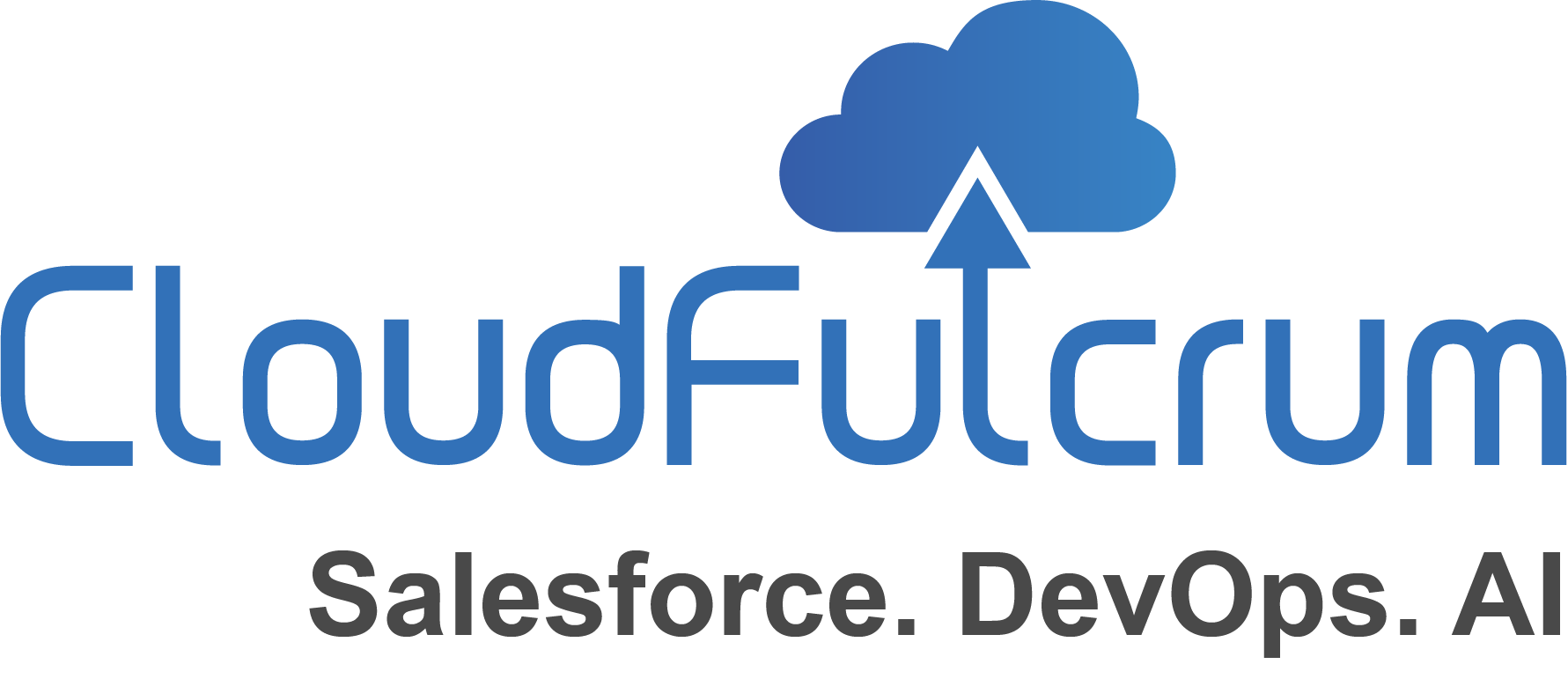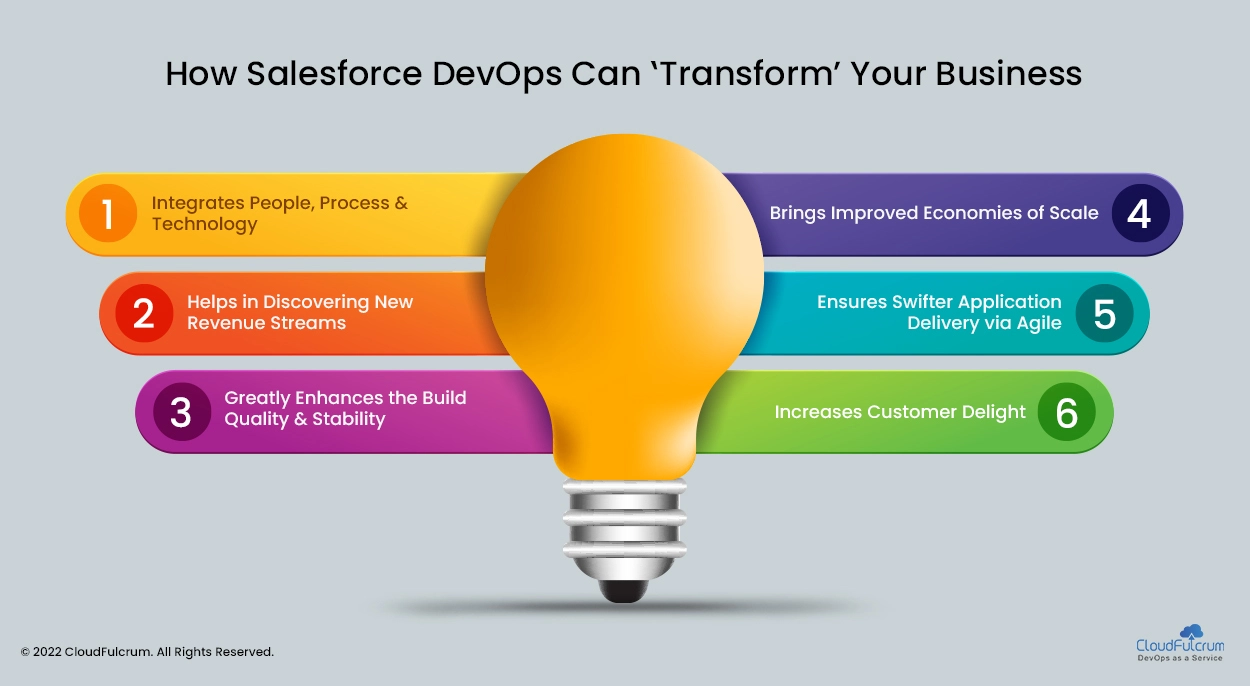Introduction
With increase in competition every day, surviving in an extremely cut-throat competitive world is getting as difficult as tight-rope walking for IT companies. To enjoy the benefits of an early entrant in any market, it is critical to develop products faster and shrink the release cycles. That’s exactly where Salesforce DevOps – with its ability to automate the delivery pipelines of companies – can be extremely useful for IT companies. Contrasted with the traditional ways of functioning, where Development and Operations teams used to work separately, Salesforce DevOps encourages collaborative efforts that break the silos. Salesforce DevOps enables organizational and cultural rethink of how IT organizations can become agile and innovative.
Salesforce DevOps transformation will bring significant cultural and procedural changes. It will mark the beginning of shared decision making. While collaboration and standardization may be marginally disorganized initially, with the effluxion of time, it will be refined and lead to steady optimization with the aid of the metrics tracked. When you are implementing the process of Salesforce DevOps transformation, firstly observe the current position of the organization on different metrics such as agility and ability to handle change. Secondly, measure how things work currently and identify the biggest pain points and impediments. Thirdly, start resolving the issues that are apparent by employing tools and techniques such as CI/CD, automation, etc., and structure them. Finally, repeat the steps. DevOps is not a one-off process and as new issues emerge, be prepared to repeat the process and change incrementally.
How Salesforce DevOps Can ‘Transform’ Your Business
1: Salesforce DevOps Integrates People, Process & Technology and Enables Swifter Innovation
Salesforce DevOps enables organizations to create new value to their customers swifter, thereby allowing them to mature and digitally transform such organizations. Salesforce DevOps integrates people, process, and technology, and when all three are streamlined towards the same business goals, innovation happens swifter.
Salesforce DevOps also helps prevent internal waste of people and tools via greater focus on digital innovations. This releases more resources that were either ‘unused’ or ‘wasted’ on other insignificant tasks, so that teams can work on the most significant and critical tasks. Without Salesforce DevOps, it is next to impossible to think about keeping up with swifter releases of new technology and competition, and responding to market events and customer requirements within a fixed time. Salesforce DevOps ensures quality of releases, guarantees automation of the release process, and makes scaling of software innovation much easier.
2: Salesforce DevOps Helps in Discovering New Revenue Streams
In an ecosystem where speed-to-market is critical to an organization’s survival, Salesforce DevOps is an indispensable component of a technology strategy. Salesforce DevOps remarkably improves agility, allowing extremely swift response to dynamic requirements or market conditions. In any ‘digital transformation,’ ‘digital’ is critical, implying the transformation relies on how you take advantage of technology in novel and more efficacious ways to accomplish business goals. Salesforce DevOps represents an evolved way of working for organizations, across the entire value chain, to bring new services to the market and to discover totally new revenue streams, which was previously unimaginable.
3: Salesforce DevOps Greatly Enhances the Build Quality & Stability
The collaboration of Development and Operations in Salesforce DevOps promotes the culture of knowledge and information sharing. As a result, it brings together attributes that are both development-centric, such as features, performance, and re-usability and attributes that are operations-centric, such as deployability and maintainability, to improve the overall code quality. If we take into account the distribution of deployment frequency, deployment leads to time, and mean time to recover (MTTR), Salesforce DevOps helps in building not only a better initial code quality, but also enhanced testing. This collaboration enables continuous delivery improvement, which ultimately leads to better code quality and stability.
4: Salesforce DevOps Brings Improved Economies of Scale
In addition to effective collaboration, Salesforce DevOps also enables sound automation. Organizations can take advantage of this feature and be free from all kinds of worries to automate repetitive tasks devoid of any errors. For example, regression and performance testing can bring about a small change in a swift manner. Development can become more solid and stable via regular backups and rollovers. Automation of all these functions can help organizations cut down huge manual costs. If the scope of the organization is large, this can seriously imply immense monetary savings.
5: Salesforce DevOps Ensures Swifter Application Delivery via Agile
In a traditional setup, the Development team first builds the code and then tests it in an isolated environment, after which the Operations team takes over for production. This non-collaboration between the two teams results in lots of misunderstandings, as they aren’t on the same page regarding infrastructure, configuration, deployment, log management, and performance monitoring. This, in turn, decelerates the production process.
With Salesforce DevOps enabling integration of all the IT related teams, organizations can expedite delivery and shrink the release time. Moreover, it allows faster detection of errors that keep code in a releasable state at all times. Due to the collective effects of all these factors, organizations can go to market at their expected time and enjoy the benefits of competitive edge.
6: Salesforce DevOps Increases Customer Delight
In today’s new digital world, agility and responsiveness are more important than control. Salesforce DevOps creates the capabilities from both technology and organizational perspective to deal with the increasing demands in connection with agility and complexity.
Salesforce DevOps organizations are streamlined for agility, with product teams able to react swiftly to new information. This new information can come directly from production through telemetry systems that enable organizations to assess their functional experiments. Due to the velocity of delivery and the divergent digital architecture, we can run many experiments simultaneously, creating systems that increase customer delight to make them more and more happy.
Conclusion
These are the three solid takeaways of Salesforce DevOps transformation:
- Improved Quality: In a Salesforce DevOps culture, improved quality can be assured by asking the right questions to the leadership, such as: ‘what is the biggest worry?’ ‘what is lacking?’ and so on, and planning the transformation around it.
- More Frequent Releases: Since Salesforce DevOps addresses important quality concerns, there will be fewer unpleasant surprises for the team and users. This is because the visibility to the processes increases and the critical quality checks with highest risks are done much before.
- Greater Adaptability: Adaptability in this paradigm is not about changing the business model, but rather continuous improvements in the release process with constant changes in business needs. To begin with, speed might be the most significant, but later stability will become more critical, and this can be achieved incrementally.
These three factors together ensure that there is lesser wasted effort and greater predictability, which will directly reflect on productivity and profitability of your organization.
About CloudFulcrum
With its mission of “DevOps as a Service,” CloudFulcrum has been a part of multiple successful Salesforce implementations worldwide with delighted customers in BFSI, Healthcare, Retail, Real Estate, and Technology verticals.
With our Salesforce DevOps consulting, we help enterprises align their Digital Transformation goals to achieve higher efficiency, faster time-to-market, and better quality of software builds with early identification of arising issues, enabling continuous release of Salesforce applications.

